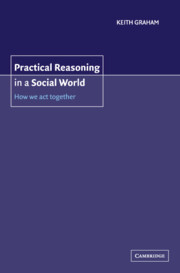Book contents
- Frontmatter
- Contents
- Preface
- Acknowledgements
- Introduction
- 1 Practical reasoning in context
- 2 The indistinctness of persons: causal interconnection
- 3 The indistinctness of persons: the personhood of collectivities
- 4 Practical collective identification and dissociation
- 5 Practical reasoning: sources and constraints
- 6 Practical reasoning and morality
- Conclusion
- Bibliography
- Index
3 - The indistinctness of persons: the personhood of collectivities
Published online by Cambridge University Press: 22 September 2009
- Frontmatter
- Contents
- Preface
- Acknowledgements
- Introduction
- 1 Practical reasoning in context
- 2 The indistinctness of persons: causal interconnection
- 3 The indistinctness of persons: the personhood of collectivities
- 4 Practical collective identification and dissociation
- 5 Practical reasoning: sources and constraints
- 6 Practical reasoning and morality
- Conclusion
- Bibliography
- Index
Summary
In the previous chapter I called attention to some of the difficulties in embracing D2, the idea of the distinctness of persons construed as separateness. In the present chapter I do the same for D1, the distinctness of persons construed as qualitative distinctness: the distinctness of persons not from each other but from other kinds of entity. As in the previous chapter, I begin from premises which I hope are truistic and therefore the most likely premises to command general assent: in this case the fact of collective agency mentioned in the Introduction, the fact that some of the things a person does gain their significance from being part of some collective action. I then attempt to derive conclusions which are far from truistic and would certainly not command general assent.
I argue that collective entities of a certain kind are an irreducible part of the social world we inhabit; that membership of such entities is a significant part of the identity of individual persons; and that such entities exhibit some important characteristics in common with individual persons. The title of this chapter therefore introduces a topic rather than enunciating a thesis. I do not claim that collectivities are persons; but I raise the question how far they share important characteristics in common with persons, and the answer I suggest is that they do so to a significantly high degree. In particular, they share enough characteristics to enter the moral realm in their own right.
- Type
- Chapter
- Information
- Practical Reasoning in a Social WorldHow We Act Together, pp. 66 - 104Publisher: Cambridge University PressPrint publication year: 2002



